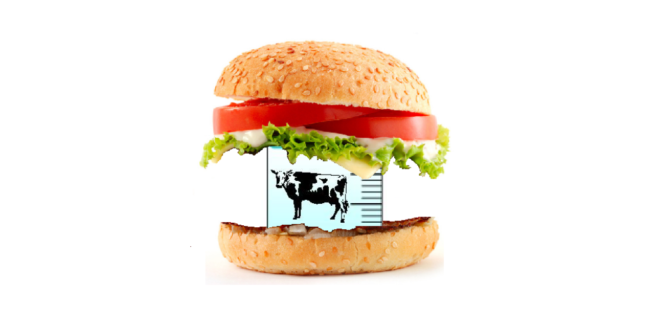Holly Kerr looks at the possibility of lab-grown meat to replace traditional farming as a solution to the environmental crisis at steak (expect more puns).
Step aside Quorn, soy, seitan and the rest of the fake-meat wannabes. A future of man-made, environmentally friendly meat (yes, real meat) may be on the horizon. Clean meat, cellular agriculture and in vitro meat are terms being tossed around to describe the rising field of laboratory-produced meat. Cellular agriculture is the production of meat, as well as other animal products, from cell culture in a lab as opposed to livestock on a farm. Using established biotechnological methods, cellular agriculture could offer a promising alternative to traditional meat-eaters: one that’s both cruelty-free and sustainable.
The need for a new way to produce food is pressing. We’re currently living on the busiest Earth ever, with around 7% of humans to have ever lived residing on the planet today. And it’s only getting busier, with the UN predicting that, in 2050, the world population will have risen to 9.8 billion people. All around us, the effects of a booming population and human-generated greenhouse gases are difficult to ignore. 2019 saw a series of natural disasters. The California wildfires, flooding in India and Typhoon Hagibis in Japan were all more severe as a result of climate change1. Climate change is a global emergency and our window of opportunity to prevent its worst impacts from being realised is closing fast. The way we are living needs to change.
Our diet and consumer habits have a large collective impact on the environment, with meat production representing a huge source of greenhouse gas emissions. Going vegan is said to be the single biggest way you can reduce your impact on the earth and it’s well known that this lifestyle choice is on the rise. In 2016, there were over half a million vegans in the UK 2, myself included! However, as I know all too well, it’s not for everyone and for many, meat is still an important part of daily life. Cellular agriculture promises to fulfil both the food industry’s shift towards sustainability and the carnivorous demands of consumers.
Lab-grown meat is no mere pie in the sky. In 2013, cellular agriculture made the news and became a reality when Mark Post and his team from Maastricht University unveiled the world’s first tissue-engineered hamburger in London. Mark Post now runs Mosa Meat3, one of the many start-up companies that exist in this expanding industry. The process of cellular agriculture usually relies on stem cells – cells with the potential to develop into any other possible cell of an organism, and which can be extracted from an animal in a relatively easy and pain-free procedure. The cells are grown in a bioreactor on specialised scaffolding material. Here, cells are given the precise environment, nutrients and proteins needed to grow into muscle, fat or connective tissue cells. We can effectively mimic the cell maturation and specialisation process that would occur in the development of an animal, without using the animal itself.
In a recent documentary, Apocalypse Cow: How Meat Killed the Planet by George Monbiot4, the prospect of cellular agriculture is not only considered, but deemed absolutely necessary by the environmental campaigner if we want to continue eating meat. Consequently, he calls for an end to agricultural farming as we know it. Here’s his case: UK farmland for grazing livestock and growing grass takes up a shocking 55% of the country’s surface5. This is undoubtedly inefficient and environmentally unsustainable.
For example, comparing emission figures of long-haul flights from the UK government to emissions of meat production, Monbiot has claimed that producing just 4kg of beef can have as high a carbon footprint to a single passenger taking a return flight from London to New York6. Monbiot explores the idea of rewilding the land taken up by livestock in the UK, and looks to a successful example in Holland. Here, they have restored natural ecosystems by reintroducing native animals and plants and letting nature take its course. Could Britain do the same if we ditched farming and turned to biotechnology to produce meat for our Sunday roasts, ham toasties and sausage rolls?
Fewer farmed animals, lower environmental costs, and the re-expansion of natural habitats and wildlife make growing meat in the lab an exciting prospect. This new approach to farming meat is not on the shelves just yet; hurdles including regulation, cost, scalability and public perception still have to be overcome. However, embracing cellular agriculture could be one of the most pivotal ways in the 21st century we reduce our negative impact on the Earth. With the increasing risk of climate change wiping us all out in the future, humanity is at steak!
This article was specialist edited by Lauren Shotter and copy-edited by Rachael Sulaiman
References
- https://mediacentre.christianaid.org.uk/strongnew-report-2019-saw-world-counting-the-cost-of-climate-breakdown-strong/)
- www.vegansociety.com/whats-new/news/find-out-how-many-vegans-there-are-great-britain
- www.mosameat.com/
- You can stream Apocalypse Cow: How Meat Killed the Planet on Channel 4 here
- https://assets.publishing.service.gov.uk/government/uploads/system/uploads/attachment_data/file/654742/structure-jun2017final-eng-26oct17.pdf
- www.monbiot.com/2015/12/22/sacrifice/

